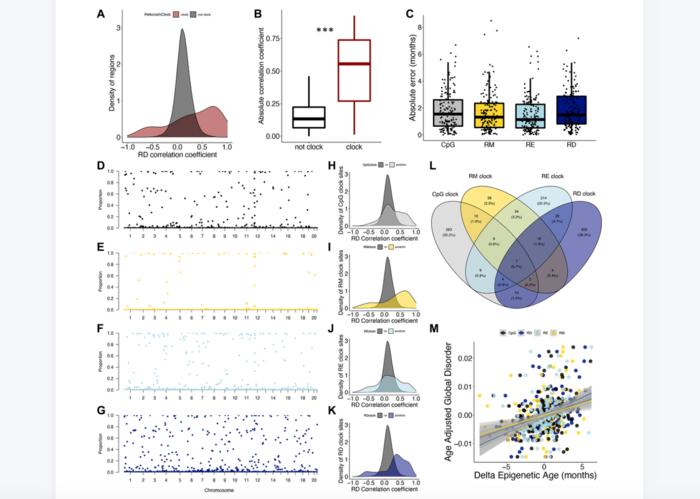“In this study, we report an approach for spatially resolving genomic patterns of DNA methylation disorder […]”

Credit: 2024 Bertucci-Richter et al.
“In this study, we report an approach for spatially resolving genomic patterns of DNA methylation disorder […]”
BUFFALO, NY- February 6, 2024 – A new research paper was published in Aging (listed by MEDLINE/PubMed as “Aging (Albany NY)” and “Aging-US” by Web of Science) Volume 16, Issue 2, entitled, “Epigenetic drift underlies epigenetic clock signals, but displays distinct responses to lifespan interventions, development, and cellular dedifferentiation.”
Changes in DNA methylation with age are observed across the tree of life. The stereotypical nature of these changes can be modeled to produce epigenetic clocks capable of predicting chronological age with unprecedented accuracy. Despite the predictive ability of epigenetic clocks and their utility as biomarkers in clinical applications, the underlying processes that produce clock signals are not fully resolved, which limits their interpretability.
In this new study, researchers Emily M. Bertucci-Richter, Ethan P. Shealy, and Benjamin B. Parrott from the University of Georgia developed a computational approach to spatially resolve the within read variability or “disorder” in DNA methylation patterns and test if age-associated changes in DNA methylation disorder underlie signals comprising epigenetic clocks.
“Herein, we apply novel read-based strategies to resolve age-associated epigenetic disorder across the mouse genome.”
The team found that epigenetic clock loci are enriched in regions that both accumulate and lose disorder with age, suggesting a link between DNA methylation disorder and epigenetic clocks. They then developed epigenetic clocks that are based on regional disorder of DNA methylation patterns and compared their performance to other epigenetic clocks by investigating the influences of development, lifespan interventions, and cellular dedifferentiation. The researchers identified common responses as well as critical differences between canonical epigenetic clocks and those based on regional disorder, demonstrating a fundamental decoupling of epigenetic aging processes.
“Collectively, we identify key linkages between epigenetic disorder and epigenetic clocks and demonstrate the multifaceted nature of epigenetic aging in which stochastic processes occurring at non-random loci produce predictable outcomes.”
Read the full paper: DOI: https://doi.org/10.18632/aging.205503
Corresponding Author: Emily M. Bertucci-Richter
Corresponding Email: [email protected]
Keywords: epigenetic aging, epigenetic drift, epigenetic rejuvenation, lifespan, DNA methylation
Click here to sign up for free Altmetric alerts about this article.
About Aging:
Launched in 2009, Aging publishes papers of general interest and biological significance in all fields of aging research and age-related diseases, including cancer—and now, with a special focus on COVID-19 vulnerability as an age-dependent syndrome. Topics in Aging go beyond traditional gerontology, including, but not limited to, cellular and molecular biology, human age-related diseases, pathology in model organisms, signal transduction pathways (e.g., p53, sirtuins, and PI-3K/AKT/mTOR, among others), and approaches to modulating these signaling pathways.
Please visit our website at www.Aging-US.com and connect with us:
- X, formerly Twitter
- YouTube
- Spotify, and available wherever you listen to podcasts
Click here to subscribe to Aging publication updates.
For media inquiries, please contact [email protected].
Aging (Aging-US) Journal Office
6666 E. Quaker Str., Suite 1B
Orchard Park, NY 14127
Phone: 1-800-922-0957, option 1
###
Journal
Aging-US
DOI
10.18632/aging.205503
Method of Research
Observational study
Subject of Research
Animals
Article Title
Epigenetic drift underlies epigenetic clock signals, but displays distinct responses to lifespan interventions, development, and cellular dedifferentiation
Article Publication Date
26-Jan-2024




